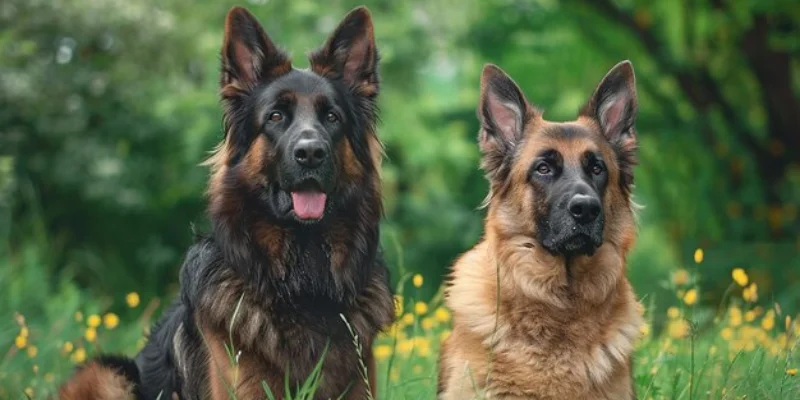Exploring the Mix Breed of Rottweiler and German Shepherd
Updated: August 10, 2024
32
Mix breed of Rottweiler and German Shepherd combines the distinctive characteristics of two renowned dog breeds, resulting in a unique and versatile companion. This article delves into the origins, traits, and care considerations of this fascinating hybrid.
History of the Mix Breed
Origins of Rottweiler and German Shepherd Breeds
The Rottweiler, originating in Germany, was historically bred for herding and guarding livestock. Known for their strength and loyalty, Rottweilers later became popular as police and service dogs due to their intelligence and protective instincts. On the other hand, the German Shepherd breed was developed by Captain Max von Stephanitz in the late 19th century and prized for its versatility in various roles, including herding, search and rescue, and military work.

How and Why the Mix Breed Came to Be
The mixed breed of Rottweiler and German Shepherd likely arose from the desire to combine the best traits of both breeds. Breeders sought to create a dog that not only possessed the robustness and protective instincts of the Rottweiler but also the intelligence, trainability, and athleticism of the German Shepherd. The resulting hybrid often exhibits a balanced blend of characteristics from both parent breeds.
Rottweiler German Shepherd Mix: Key Characteristics
| Category | Description |
|---|---|
| Origin | Cross between a Rottweiler and a German Shepherd, two popular breeds known for intelligence, loyalty, and protective nature. |
| Physical Characteristics | Muscular build, distinctive markings of Rottweiler, agility, and athletic ability of German Shepherd. |
| Intelligence | Highly intelligent, quick learner, responsive to training. |
| Loyalty and Affection | Loyal and affectionate with family, reserved with strangers. |
| Protective Instincts | Excellent guard dogs, inherit the protective nature of both parent breeds. |
| Energy Level | High energy, requires regular exercise and mental stimulation. |
| Health | Prone to health issues common in both parent breeds (hip dysplasia, digestive issues). |
| Grooming | Regular grooming is required to prevent matting and tangling. |
| Training | Early socialization and training are crucial for good behavior. |
| Family Suitability | Suitable for active families with children, not ideal for inexperienced owners or low-maintenance seekers. |
Physical Appearance of Mix Breed
Description of Typical Physical Features
Mixes of Rottweiler and German Shepherd can vary widely in appearance. They typically have a muscular build with a strong and sturdy frame. Their head may resemble either parent breed, often with a broad muzzle and expressive eyes. Ears can be erect or floppy, depending on genetics, and they usually have a straight back and a well-set tail.
Mix Breed Common Coat Colors and Patterns
Coat colors in Rottweiler and German Shepherd mix commonly include black and tan, sable, or solid black. Some may inherit the distinctive markings of a Rottweiler or the saddle pattern of a German Shepherd. Their coat is usually dense and may be of medium length, requiring regular grooming to maintain its health and shine.
Personality and Temperament
Traits Inherited from Both Rottweilers and German Shepherds
The mixed breed inherits a blend of personality traits from its parent breeds. It is often loyal, protective, and devoted to its families, much like Rottweilers. German Shepherds may acquire intelligence, eagerness to work, and a strong sense of loyalty to their handlers.
Behavioral Traits
Rottweiler and German Shepherd mixes are highly intelligent and adaptable dogs, excelling in learning and requiring regular mental stimulation. While they’re loving and loyal to their families, they tend to be cautious around strangers, making them effective guard dogs. Additionally, their playful and energetic personalities make them ideal companions for active individuals or families who enjoy outdoor activities and playtime. Training and Exercise Needs
Importance of Training
Due to their intelligence and strong-willed nature, consistent and positive reinforcement-based training is essential for Rottweiler and German Shepherd mixes. Early socialization helps them develop into well-mannered adults who are comfortable in various environments and with different people and animals.

Recommended Exercise Routines
These hybrids are energetic and require regular exercise to stay healthy and happy. Daily walks, interactive play sessions, and activities such as obedience training, agility, or even scent work can help channel their energy constructively. Mental stimulation is equally important to prevent boredom and destructive behaviors.
Mix Breed Health Issues
Common Health Concerns
Rottweilers and German Shepherds are susceptible to certain health conditions, and their mixes may inherit these tendencies. Common issues include hip dysplasia, elbow dysplasia, bloat, and certain genetic disorders. Regular veterinary check-ups, a balanced diet, and maintaining a healthy weight are crucial for their well-being.
Precautions and Preventive Measures
Owners should be aware of the signs and symptoms of these health issues and take proactive measures to mitigate risks. Providing a nutritious diet, regular exercise, and appropriate preventive care such as vaccinations and parasite control are fundamental aspects of responsible pet ownership.
Adoption and Care Tips of Mix Breed
Tips for Adopting a Mix Breed of Rottweiler and German Shepherd
When considering adoption, research reputable breeders or rescue organizations that prioritize the health and welfare of their dogs. Meet the puppy’s parents if possible to assess temperament and ensure they are well cared for. Adoption provides a loving home for a dog in need and offers a rewarding experience for the adopter.
Recommended Care Routines
Grooming routines should include regular brushing to keep their coat healthy and minimize shedding. Proper dental care, nail trimming, and ear cleaning are also essential parts of their grooming regimen. Feeding a high-quality diet appropriate for their age and activity level supports overall health and longevity.
Conclusion
In conclusion, the mix breed of Rottweiler and German Shepherd offers a blend of the best traits from both parent breeds, making them versatile companions and excellent working dogs. Their loyal and protective nature, combined with intelligence and adaptability, makes them well-suited for active families or individuals seeking a devoted canine partner.
Understanding their origins, physical characteristics, temperament, and specific care needs equips potential owners with the knowledge to provide a loving and fulfilling life for their mixed-breed dogs. Whether through adoption or responsible breeding practices, welcoming a Rottweiler and German Shepherd mix into your home promises years of companionship and cherished memories.
FAQs
What do you get when you cross a Rottweiler and a German Shepherd?
You get a mixed breed of Rottweiler and German Shepherd, also known as a “Shepweiler” or a “Rottie Shepherd.
Are mix breeds of Rottweiler and German Shepherd good family pets?
Yes, Shepweilers are known to be loyal, protective, and intelligent companions that can make great family pets.
Do mixed breeds of Rottweiler and German Shepherd require a lot of exercise?
Yes, Shepweilers are active dogs that require regular exercise to stay healthy and happy. Daily walks, runs, and playtime are essential for their well-being.
Are mixed breeds of Rottweiler and German Shepherd easy to train?
Yes, Shepweilers are intelligent dogs that respond well to positive reinforcement training methods. Consistent training and socialization from an early age are key to raising a well-behaved Shepweiler.
Do mix breeds of Rottweiler and German Shepherd have any health concerns?
Like all dogs, Shepweilers may be prone to certain health issues such as hip dysplasia, bloat, and obesity. Regular vet check-ups and a healthy diet can help prevent and manage these health concerns.
Are mix breeds of Rottweiler and German Shepherd good guard dogs?
Yes, Shepweilers are naturally protective and can make excellent guard dogs. However, proper training and socialization are important to ensure they are well-balanced.
Please Write Your Comments